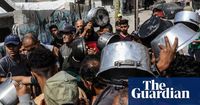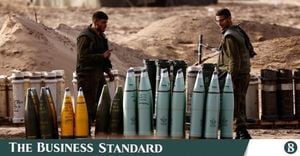The Netherlands has taken a significant step in advocating for human rights by calling for a revision of the European Union's trade agreement with Israel, valued at €46.8 billion annually. On May 6, 2025, Dutch Foreign Minister Caspar Veldkamp sent a formal letter expressing deep concerns over Israel's ongoing blockade of humanitarian aid and electricity to the Gaza Strip, citing these actions as violations of international humanitarian law.
In his correspondence to Kaja Kallas, the European Union High Representative for Foreign Affairs and Security Policy, Veldkamp articulated the urgency of the situation, stating, "The situation in the Gaza Strip is rapidly deteriorating—it is dramatic, catastrophic. Israel’s blockade of humanitarian aid is in violation of the laws of war." This strong condemnation reflects a shift in the Netherlands' traditionally supportive stance towards Israel within the EU.
Veldkamp's letter not only calls for a review of the EU-Israel Association Agreement, which underpins the EU-Israeli free trade agreement, but also announces that the Dutch government will veto any extension of the EU-Israel Action Plan. This plan, which has been in place since 2000, requires unanimous support from all EU foreign ministers for renewal. Veldkamp emphasized that the Netherlands would block European cooperation with Israel until allegations of human rights abuses are thoroughly investigated.
As the EU's largest trading partner, Israel accounted for 28.8% of its trade in goods in 2022, making the implications of the Netherlands' stance particularly significant. Veldkamp's comments come amid heightened scrutiny of Israeli Prime Minister Benjamin Netanyahu's policies, particularly regarding his prioritization of military action over humanitarian considerations. Veldkamp noted, "The criticism in Israel is increasing against the prime minister that he does not give enough priority to the release of the hostages, and he has now stated also that he doesn’t give that ultimate priority, but he gives the priority to fighting Hamas."
Moreover, Veldkamp's remarks highlight a growing concern within the EU about Israel's proposed system of aid distribution, which he argues is incompatible with the principles of neutrality, impartiality, and independence. He stated, "You cannot starve the people of the Gaza Strip. It is against international law. It’s morally wrong. It’s dangerous. I don’t think it’s in Israel’s own interest." This perspective has been echoed by various NGOs advocating for a stronger EU response to the humanitarian crisis in Gaza.
In a broader context, Veldkamp's position reflects a significant shift within the Dutch government, which has historically been one of Israel's most loyal allies in the EU. The call for an urgent review of the EU-Israel association agreement comes at a time when the humanitarian situation in Gaza has reached critical levels, with reports of widespread suffering due to the blockade. Veldkamp described the Israeli ban on the supply of aid as "catastrophic, truly dismal" and in clear breach of international humanitarian law.
During a two-day informal EU foreign ministers meeting in Poland, which began on May 7, 2025, Veldkamp is expected to address these pressing issues. He has already summoned the Israeli ambassador to The Hague for clarification regarding the Israeli Defense Forces' expanding ground operations in Gaza, particularly following a March 23 incident where several aid workers were reportedly killed alongside Hamas militants in a convoy of Palestinian ambulances.
Geert Wilders, the leader of the Party for Freedom and a senior coalition partner, criticized Veldkamp's approach as "clumsy and premature," arguing that it undermines Israel's right to defend itself against terrorism. Wilders, a staunch supporter of Israel, expressed his views during discussions with Israeli Foreign Affairs Minister Gideon Sa’ar and Defense Minister Israel Katz, assuring them of the support for Israel’s actions against "Islamic terror."
Despite internal disagreements within the Dutch government regarding the approach to Israel, Veldkamp remains firm in his belief that a ceasefire is crucial for the release of hostages held by Hamas. He stated, "Hamas has to release the hostages as soon as possible. Hamas cannot be part of the future governance of the Gaza Strip." This reflects a nuanced understanding of the complexities at play, as the Dutch government navigates its diplomatic relationships while advocating for humanitarian principles.
As discussions continue within the EU, the potential implications of the Netherlands' stance on the EU-Israel relationship could be profound. With Veldkamp's call for a review of the association agreement, there is a growing expectation that the EU may need to reassess its diplomatic and economic ties with Israel in light of the ongoing humanitarian crisis.
The situation remains fluid, with the international community closely monitoring developments. The Dutch government’s actions may set a precedent for other EU member states, potentially leading to a more unified stance on human rights and humanitarian issues in the region. As Veldkamp noted, "It is time to work for peace," emphasizing the need for a shift in strategy that prioritizes human rights and humanitarian considerations in the ongoing conflict.




